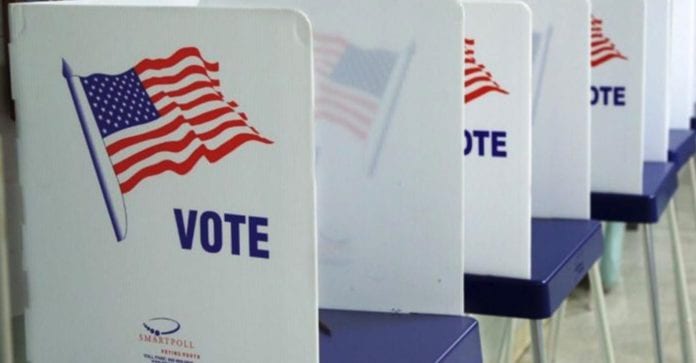by Emily Wagster Pettus —
JACKSON, Miss. — Mississippi voters will decide this year whether to simplify the process for electing a governor and other statewide officials by eliminating a step that’s a bit like the electoral college in the presidential race.
Republican Gov. Tate Reeves argues the proposed change is only designed to help Democrats. But voting-rights advocates say Mississippi needs to erase a procedure that’s rooted in the state’s racist history of trying to undermine Black voting rights.
The Mississippi Constitution currently requires a statewide candidate to win a majority of the popular vote and a majority of the electoral vote. One electoral vote goes to the candidate receiving the most support in each of the 122 state House districts.
But representatives are not obligated to vote as their districts did. That means the election could be decided by deal-making or even by the whim of a lawmaker who disagrees with the majority of voters in his or her own district.
The last time a governor’s race was thrown to the Mississippi House was in January 2000. Nobody received the required majorities in a four-person governor’s race in 1999. The top two candidates were white, and each won 61 electoral votes. In January 2000, House members chose Democrat Ronnie Musgrove, a one-term lieutenant governor who led the popular vote for governor, over Republican former U.S. Rep. Mike Parker. At the time, the House was controlled by Democrats. It is now controlled by Republicans.
Under proposed constitutional amendment on Mississippi’s ballot this year, winning a race for governor or other statewide office would only require a majority of the popular vote. If nobody wins outright with at least three candidates on the ballot, the top two would go to a runoff. The requirement to win a majority of state House districts would disappear.
Mississippi is the only state with a multistep process for electing a governor. It was written when white politicians across the South were enacting laws to erase Black political power gained during Reconstruction. The separate House vote was promoted as a way for the white ruling class have the final say in who holds office.
For years, critics have said the process violates the principle of one person-one vote. And for years, legislators have done nothing to change it, although a few have tried.
Democrats thought the electoral provision might come into play in a tight 2019 governor’s election. But Reeves, who had served two terms as state treasurer and two as lieutenant governor, easily defeated three candidates, including Democrat Jim Hood, who had served four terms as attorney general.
Legislators put the proposed constitutional amendment on this year’s ballot only after Black plaintiffs sued the state over its electoral process last year.
During a state election commission meeting last month, Reeves said: “The ballot initiative as it currently stands is going to have one effect and only one effect, and that is to help Democrats — help Democrats try to keep Republicans from getting elected to governor.”
About 38% of Mississippi’s residents are Black. The lawsuit, which was backed by former U.S. Attorney General Eric Holder, argued that Mississippi’s election system violates the principle of one-person, one-vote.
Plaintiffs said Mississippi’s history of racially polarized voting means that candidates preferred by Black voters must receive a higher share of the statewide vote to win a majority of House districts.
Days before the 2019 governor’s race, U.S. District Judge Daniel P. Jordan III wrote that he has “grave concern” about the constitutionality of the electoral vote provision. Jordan wrote that the plaintiffs’ argument about violation of one person, one vote is “arguably … their strongest claim.”
Jordan put the lawsuit on hold in December and said he would give legislators a chance to remedy the system by putting a proposed constitutional amendment on the ballot. The amendment will need approval from a simple majority of voters.
____
(Emily Wagster Pettus has covered Mississippi government and politics since 1994. Follow her on Twitter: http://twitter.com/EWagsterPettus.)



